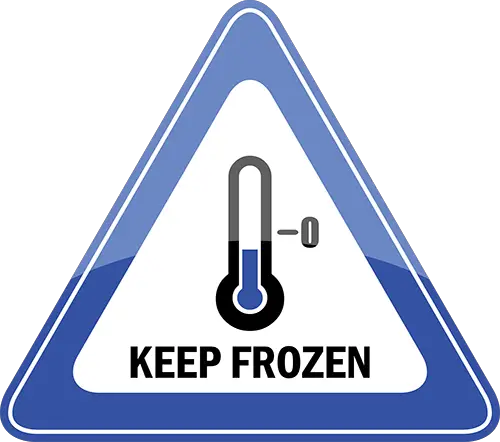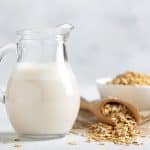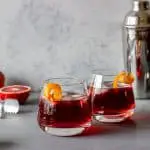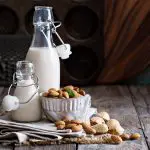What is the Freezing Point of Alcohol? (Liquor in the Freezer)
There’s nothing like the feeling of treating yourself to a glass of chilled liquor. You might have noticed that vodka never seems to freeze, no matter how long you place it in the freezer! The same is true for any bottle of hard alcohol, but it’s not the case for beer and other alcoholic drinks, which freeze quite readily.
So what is the freezing point of alcohol?
The freezing point of pure alcohol (ethanol) is -173˚ F (-114˚C) in contrast to water, whose freezing point is 32˚F. The freezing point of most alcoholic beverages, however, depends on the alcohol by volume (ABV) and the amount of water it contains.
Let’s take a closer look at this.
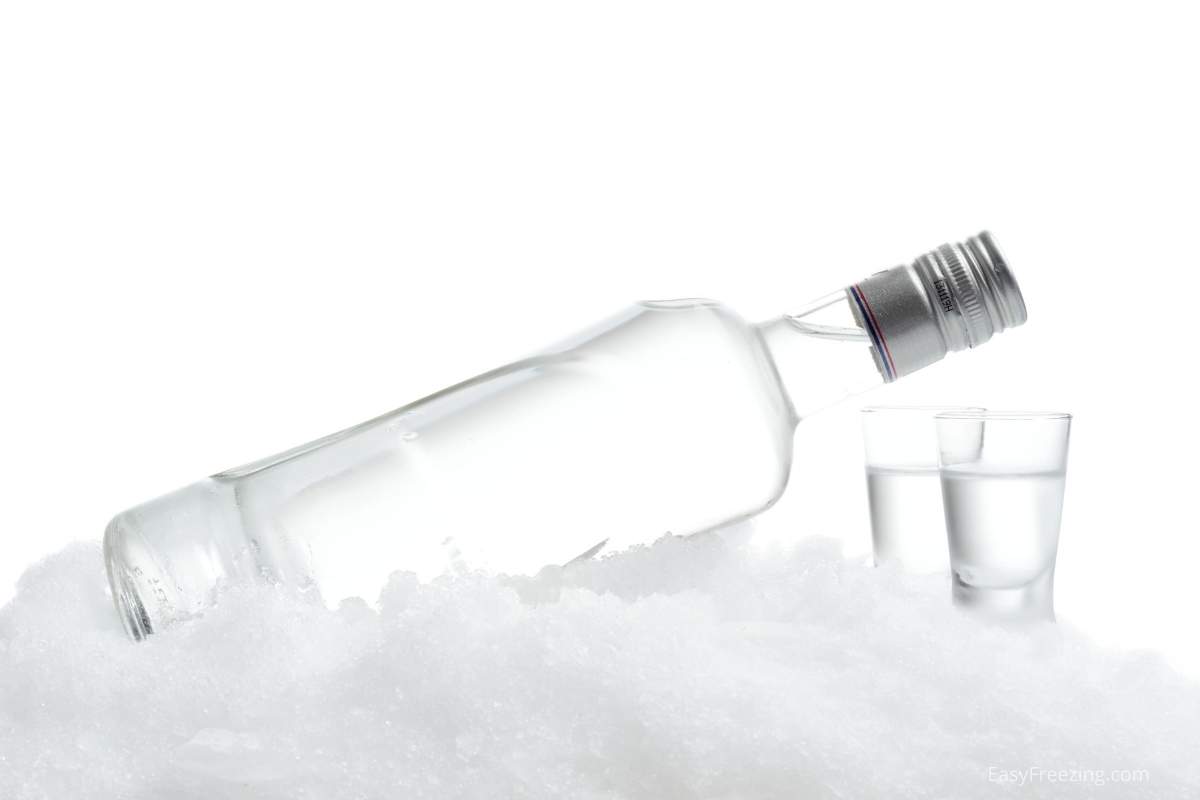
At What Temperature Does Alcohol Freeze?
| Type | ABV (Alcohol volume) | Freezing Point (F) | Remarks |
| Beer | 3% to 12% | 28 F | Should not be kept in a freezer |
| Wine | 8% to 14% | 23 F | Cannot be kept in the freezer for more than an hour or two |
| 40-proof liquor | 20% | 22 F | Avoid freezing as it may change the texture. Beverage examples include Irish cream |
| 64-proof liquor | 32% | -10 F | Can be placed in the freezer, beverage examples include amaretto and flavored whiskey |
| 80-proof liquor | 40% | -17 F | Can be placed in the freezer. Beverage examples include gin, whiskey, vodka, etc. |
Since alcoholic beverages contain both water and alcohol, the temperature at which each drink freezes will also vary. Pure alcohol, for instance, freezes at -173°F, whereas beer freezes at just 23°F. Here’s why this happens:
Freezing occurs when the molecules within a substance become rigid and are not able to move. To put it clearly, the freezing point is the temperature at which the force of attraction of a substance’s molecules becomes strong enough to withstand any motion.
Going by the molecular composition, water has a higher number of hydrogen atoms bound directly to oxygen as opposed to ethanol. Since a hydrogen-oxygen bond is stronger than a carbon-oxygen bond, water molecules are more likely to stick together at colder temperatures, causing them to freeze early.
That said, alcohol does freeze but at extremely low temperatures. Most home freezers have a temperature range between -9°F and 0°F, whereas the freezing point of pure ethanol (alcohol) is substantially lower than this. This means that you can store some types of alcohol in the freezer without worrying about it freezing.
Did you know? The reason alcohol makes us feel comfortable in the cold is because it is a vasodilator, an agent which increases our blood flow. The colder temperature gives our brain a signal that we are rehydrating and triggers peripheral circulation, cooling off our vital organs.
Which Alcoholic Drinks Should Never be Frozen?
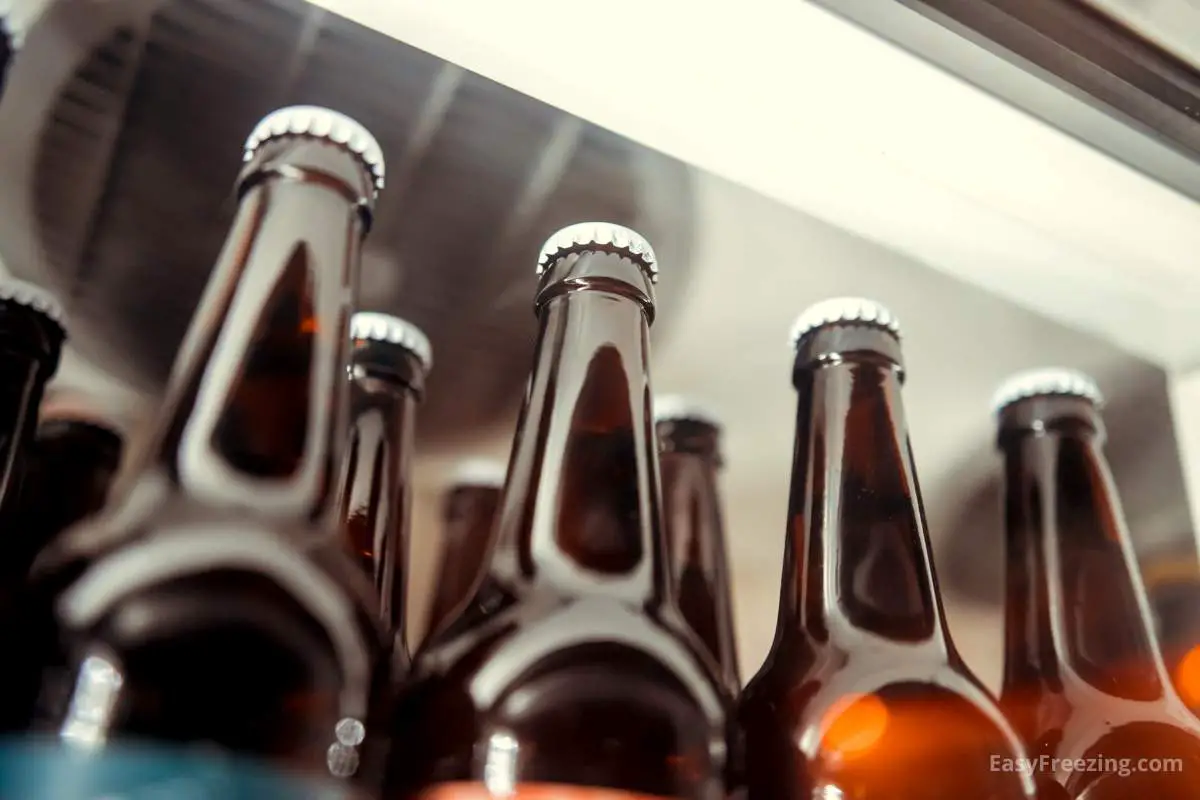
Be it beer, wine, or pure alcohol, the freezing point of any alcohol-based beverage is determined by its alcohol volume (also known as ABV or proof).
The lower the concentration of alcohol in a drink, the higher its freezing point and the faster it will freeze. Conversely, a high level of alcohol yields a lower freezing point meaning that the beverage can be left in the freezer for longer or even indefinitely.
Aside from water and alcohol, the elements which make a beverage are salt, sugars, and artificial flavoring agents. However, since their concentration is relatively small, they generally do not affect the freezing point.
Furthermore, unlike hard liquor, some drinks contain more water. This causes a volumetric expansion once they freeze, which could potentially crack the glass.
Drinks like beer, wine, and low-proof liquor can freeze easily in conventional home freezers, whereas high-proof alcohol will not.
Best Alcohols to Store in Your Home Freezer (Will Not Freeze)
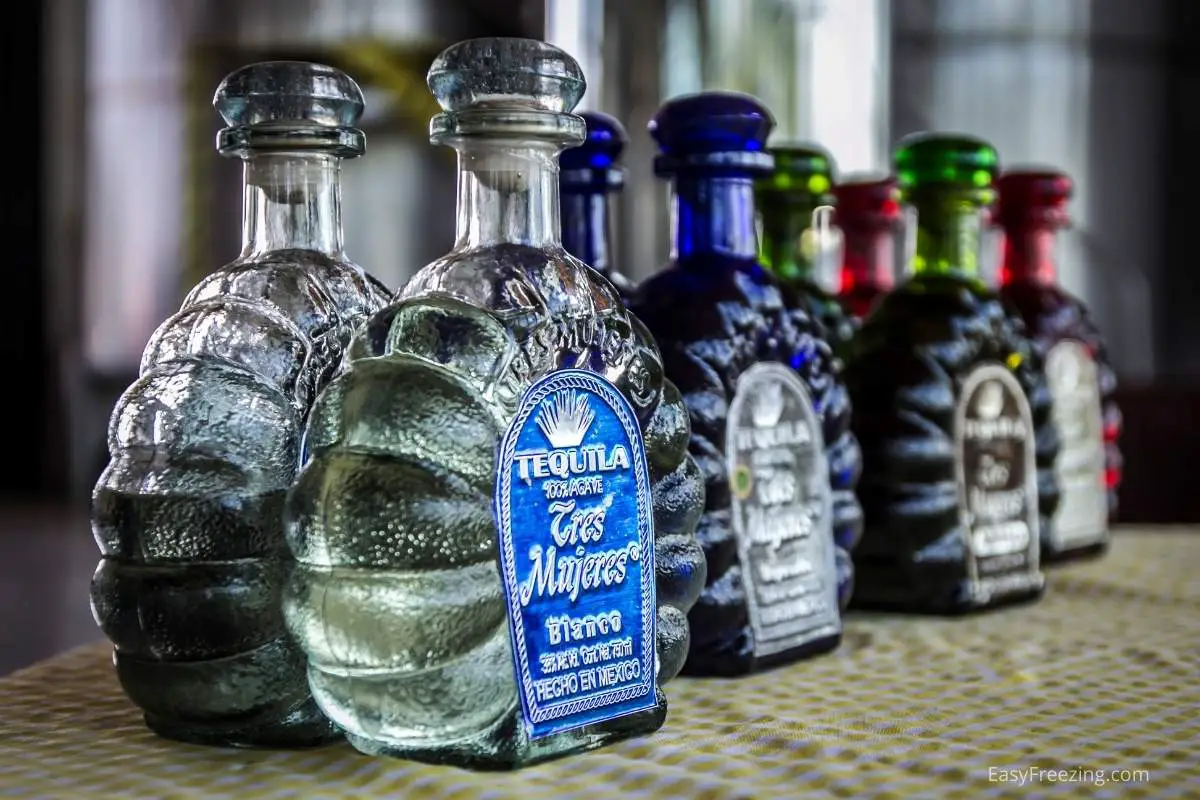
Even if you keep your freezer at 0 F, it is only cold enough to freeze ice and drinks like beer and wine. For freezing 100-proof alcohol, you would need to expand your capability and purchase a commercial-grade freezing unit that goes to an even lower temperature.
Alcoholic beverages that you can safely put in your home freezer without the risk of them freezing solid are:
- Sake
- Gin
- Rum
- Whiskey
- Tequila
- Vodka
Worst Alcohol to Put in Your Home Freezer (Likely to Freeze & Explode)
This category contains any drinks that are proofed under 40. Since the alcohol concentration is lower and the water content is higher, these drinks will freeze easily.
The following alcohols will easily freeze in your home freezer, potentially rupturing and causing a big mess:
- Beer
- Wine
- Cider
- Coolers
Freezing Alcohol FAQs
We have now established that the freezing point of a beverage, or any liquid for that matter, depends on what it’s mixed with and also the atmospheric conditions. Before you go on and pop a bottle, here are some frequent questions answered about freezing alcoholic beverages:
What Proof of Alcohol Does Not Freeze?
80-100 proof alcohol does not freeze in conventional freezers, whereas a concentration any lower than 40-proof can freeze if placed in the freezer for a long time.
Why is Vodka Often Kept in the Freezer but Whiskey Isn’t?
Vodka is often kept in the freeze because it tastes better cold, while whiskey has a flavor profile that benefits from warmer temperatures.
According to experts, while vodka won’t freeze in a home freezer, it does get thicker as the temperature drops. So vodka stored in the freezer has a smoother texture than vodka kept at room temperature, which suits a drink like a vodka.
Whiskey, on the other hand, is a barrel-aged spirit that has a number of elements that give it its signature flavor and taste. Room temperature or slightly warmed whiskey causes these elements to give off a pleasing aroma and flavor.
So while you could put whiskey in the freezer, it will taste better at room temp or greater.
What is the Freezing Point of Alcohol – Takeaway
Pure alcohol freezes at -173 F. While it is true that you can freeze vodka if you have a commercial-grade freezer, why would you want to?
On the other hand, some alcohols like vodka and tequila may taste better if kept in your home’s freezer. They won’t actually freeze, but both their texture and taste may be positively influenced.
